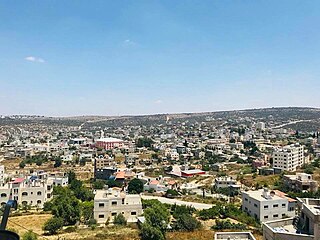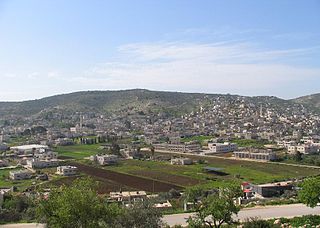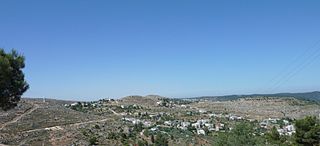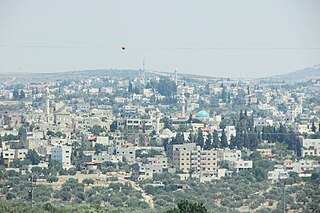Related Research Articles

Israeli settlements, or Israeli colonies, are civilian communities inhabited by Israeli citizens, overwhelmingly of Jewish ethnicity, built on lands occupied by Israel in the 1967 Six-Day War. The international community considers Israeli settlements to be illegal under international law, though Israel disputes this.

Arab–Israeli peace projects are projects to promote peace and understanding between the Arab League and Israel in different spheres. These are part of a broader attempt at a peace process between Palestinians and Israelis. Sponsors of such projects can be found both in Israel and Palestine.

The economy of the State of Palestine refers to the economic activity of the State of Palestine.

Salfit, also spelled Salfeet, is a Palestinian city in the central West Bank. Salfit is located at an altitude of 570 meters (1,870 ft) adjacent to the Israeli settlement of Ariel. According to the Palestinian Central Bureau of Statistics (PCBS), Salfit had a population of 10,911 in 2017. Since the 1995 Interim Agreement on the West Bank and the Gaza Strip, Salfit, located in Area A, has been administered by the Palestinian National Authority and has served as the administrative seat of the Salfit Governorate of the State of Palestine since then, while continuing under Israeli military occupation.

Qabatya (Arabic: قباطية, also spelled Qabatia, Qabatiya, and Kabatiya; is a Palestinian city located in the Jenin Governorate in the northern West Bank 6 km south of Jenin. According to the Palestinian Central Bureau of Statistics census, the town had a population of 19,197 in 2007.

Al-Walaja is a Palestinian village in the West Bank, four kilometers northwest of Bethlehem. It is an enclave in the Seam Zone, near the Green Line. Al-Walaja is partly under the jurisdiction of the Bethlehem Governorate and partly of the Jerusalem Municipality. According to the Palestinian Central Bureau of Statistics, the village had a population of 2,041 in 2007, mostly Muslims. It has been called 'the most beautiful village in Palestine'.

Deir Istiya is a Palestinian town of 5,200 located in the Salfit Governorate in the northern West Bank, 15 kilometers (9.3 mi) southwest of Nablus. The built-up area of Deir Istiya is 74 dunams, and its old city has about thirty families.

Yanun is a Palestinian village in the Nablus Governorate in northern West Bank, located 12 kilometers (7.5 mi) southeast of Nablus, and 3 miles north of Aqraba. It lies within Area C, under total Israeli control, of the West Bank. It is divided into two sites, upper and lower Yanun. Upper or northern Yanin is considered illegal by the Israeli authorities, and development is prohibited there. According to the Palestinian Central Bureau of Statistics (PCBS), the village had a population of 102 in 2007. This was a decrease from 2004 when the PCBS recorded that Yanun had 145 inhabitants. The residents of the village have to travel to Beit Furik for primary health care.

al-Mughayyir is a Palestinian village in the Ramallah and al-Bireh Governorate, located 27 kilometers Northeast of Ramallah and 34 kilometers Southeast of Nablus, in the northern West Bank. According to the Palestinian Central Bureau of Statistics (PCBS), the village had a population of 2,368 inhabitants in 2007.

Nahliel is a Haredi Israeli settlement in the West Bank. Located close to the Palestinian villages of Beitillu and Deir 'Ammar, and some 20 kilometres (12 mi) from Modi'in, it is organised as a community settlement and falls under the jurisdiction of the Mateh Binyamin Regional Council. In 2019 it had a population of 725.
Adei Ad is an Israeli outpost in the West Bank. Located near Shvut Rachel and Qusra, it falls under the jurisdiction of the Mateh Binyamin Regional Council. A resident of Adei Ad says that the outpost includes about 40 families. Adei Ad gained international attention in January 2015, when residents allegedly engaged in throwing rocks at a delegation from the U.S. embassy.

Nasser Abufarha is a Palestinian-American anthropologist and social entrepreneur. He is the founder of Canaan Fair Trade and the Palestine Fair Trade Association—a network of small-scale family farms organized under fair trade and organic production, active in 54 villages across the West Bank with 1500 members.
Peace Oil is an initiative of the Charities Advisory Trust, a UK-based registered charity, led by Hilary Blume which supports fund-raising by other charitable organisations. The charity describes the olive oil as "produced in Israel by Jews, Arabs, Druze and Bedouin working together ...(it) encourages co-operation between communities". The olives are grown in the foothills of the Carmel Mountains and pressed within hours of picking to produce extra virgin olive oil. The project has been running since 2006 when the oil was launched at an Israel Expo Day organised by the Zionist Federation of Great Britain and Ireland, which promoted it as a way "to support Israel’s vibrant trade...to make a difference to the actual future of Israel."
Peace Oil may refer to:

Jalud is a Palestinian village in the Nablus Governorate in the northern West Bank. It is approximately 30 kilometers (19 mi) south of Nablus and is situated just east of Qaryut, south of Qusra and northeast of Shilo, an Israeli settlement. Its land area consists of 16,517 dunams, 98 of which constitutes its built-up area. Jalud is encircled by four illegal outposts: Esh Kodesh, Adi Ad, Ahiya and Shvut Rachel. Jalud residents were blocked by both IDF forces and settlers from tending most of their farms from 2001 to 2007. In 2007 permission was given to farm their groves, twice a year for a few days, on condition that prior coordinating arrangements are made with the IDF.

Israel–Palestine relations refers to the political, security, economical and other relations between the State of Israel and the State of Palestine. Israel and the PLO began to engage in the late 1980s and early 1990s in what became the Israeli–Palestinian peace process, culminated with the Oslo Accords in 1993. Shortly after, the Palestinian National Authority was established and during the next 6 years formed a network of economic and security connections with Israel, being referred to as a fully autonomous region with self-administration. In the year 2000, the relations severely deteriorated with the eruption of the Al-Aqsa Intifada – a rapid escalation of the Israeli–Palestinian conflict. The events calmed down in 2005, with reconciliation and cease fire. The situation became more complicated with the split of the Palestinian Authority in 2007, the violent split of Fatah and Hamas factions, and Hamas' takeover of the Gaza Strip. The Hamas takeover resulted in a complete rift between Israel and the Palestinian faction in the Gaza Strip, cancelling all relations except limited humanitarian supply.

Israeli settler violence refers to acts of violence committed by Jewish Israeli settlers and their supporters against Palestinians and Israeli security forces, predominantly in the West Bank. In November 2021, Defense Minister Benny Gantz discussed the steep rise in the number of incidents between settlers and Palestinians in the West Bank, many of which result from attacks by residents of illegal settler outposts on Palestinians from neighboring villages.

Israeli–Palestinian economic peace efforts refers to efforts to promote joint economic projects between Israelis and Palestinians, as a pathway to reach peace between the two groups.

Olive trees are a major agricultural crop in the Palestinian territories, where they are mostly grown for olive oil production. It has been estimated that olive production accounted for 57% of cultivated land in the Palestinian territories with 7.8 million fruit-bearing olive trees in 2011. In 2014, an estimated 108,000 tonnes of olives were pressed producing 24,700 tonnes of olive oil – which contributed US $10.9 million in added value to the crop. Around 100,000 households rely on olives for their primary income.

Beer in Palestine is manufactured by three Palestinian microbreweries – Taybeh Brewery, Birzeit Brewery and the Wise Men Choice Brewery. There is at least one Israeli-operated brewery in an Israeli settlement in the West Bank. Several beer festivals are held annually in Palestine, including an Oktoberfest-style event hosted by the Taybeh Brewery.
References
- ↑ Yuval Azoulay. "Probe: W. Bank settlers uproot 300 Palestinian olive trees". Haaretz.
- ↑ Ewen MacAskill (14 April 2001). "Family olive groves fall to Israeli attacks". The Guardian.
- ↑ Peace Olive Oil available in USA - Olives and Olive Oil News From All Around The World